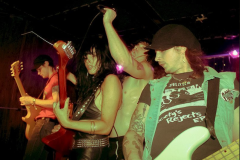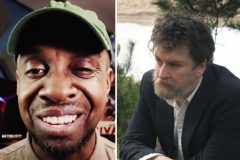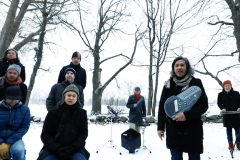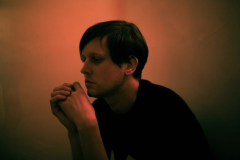The Melvins have been blazing their own trail since 1983. Their discography is so enormous that it has it’s own Wikipedia page, separate from the band’s page. To describe the band’s sound is like trying to describe the feeling of warm milk on your uvula – and that is to say, there are no concise words for such an affair. It’s heavy but it’s silky smooth, it’s plodding but it’s momentum is unyielding. You just have to experience it.
In The Melvins typically atypical fashion, the band released their first ever double album A Walk With Love and Death via the esteemed Ipecac label. The album is split into two parts – “Death” which is a proper Melvins album all by itself and “Love” which is the soundtrack to a film that doesn’t yet exist, that also bears the title of the double LP.
Drummer Dale Crover is also releasing what is his first true solo album The Fickle Finger of Fate on Joyful Noise. The album features Dale handling the lion’s share of instrumental duties and vocals and blends experimental tracks originally recorded and released as part of a very limited collection released by Joyful Noise as well as a fantastically pleasant collection more traditional songs.
Ghettoblaster: How are you man?
Dale Crover: Good, good. We’re rehearsing right now, so… We always rehearse early in the morning. We’re morning rockers. Once you get older, that’s what happens. You start doing stuff early. Then you have the rest of the day to do stuff.
GB: Haha, I’m also a Tattoo Artist, so it’s similar hours. When I hit about 40 years old, I was like, “does anybody want to get tattooed at like, 9 in the morning? Because the kids have me up, I’m ready to go.”
DC: I know. If it was up to us, we’d be doing shows in the early afternoon.
GB: Well, you know, I think that’s gonna be a thing. Some guy released this piece that was like, “If you wanna save your music scene, start your shows at 6pm” and I’m like, “I’m for it, let’s do it!”
DC: Well, unfortunately everybody works so I don’t think it’ll work out that way. I just did this tour with Redd Kross and we were trying to start shows as early as possible because we had some pretty big drives. Some of the fans were like “Thank you for starting this show so early!” You know they haven’t toured in a while so it’s people that are our age that are fans and have kids and families and jobs and have to get up early. They still wanna rock, they just want to do it early.
GB: Exactly. The will to rock doesn’t die, it just falls of your schedule at a certain point in time.
DC: That’s right.
GB: So, I want to talk about these records. I’ve been a fan and followed you guys for years and years and really excited to see Steve McDonald in with you guys because I was a Redd Kross fan too so I’m like a happy little kid to have these things in my inbox.
DC: Yeah, he’s been great. He’s somebody I’ve always thought was a really great bass player and I’ve been a Redd Kross fan for a long time too. I always thought like “that guy’s great” and I had the opportunity to play with him in OFF!, the band he’s in with Keith Morris, a few years ago. They had some stuff come up where their drummer had some other gigs or something and so they asked me to play. I’ve done that a few times with them and Steve and I hit it off right away.
I had known him before that and we were already friends and had done a few things together but we had never really played together like that. I just figured, this guy’s really good, really easy, nice guy and easy to tour with so I figured, if we ever needed somebody, he’s the guy to ask.
He’s really into it and he’s really inspiring and I think it works vice versa too. I think the stuff this new record is based on is fantastic. I’ve liked every bass player we’ve had in the past and he’s definitely one that has added his own thing and Steve’s great. We gave him free reign to work on his parts and do whatever he wanted to do with no real command or direction from us. Just let him do his own thing and he does a great job. He’s also a recording engineer so a lot of times we’ll just kind of work out some things by our selves and record maybe just a basic track of drums and guitar and then hand it on to Steve and he’ll take it and work on his part.
GB: Yeah, I noticed that he had some recording credit in the one-sheet – where he had actually done some of the recording or engineering or whatever. I was going to ask about that.
DC: Yeah, for sure. He’s got his own studio. We’ve got our own studio. He can just work at his leisure, which was fine.
GB: You guys have always had a great energy but he brings his own energy to the spot. I was catching up by watching some Youtube videos of you guys and I was stoked to see you guys did that little “Jam In The Van” thing. It was cool to see you guys shoved in that little space together just going for it.
DC: Totally. I just did this Rolling Stone interview and I was talking about how the first time I saw Redd Kross was in 1987 and they were pretty popular around the group of Seattle people that went on to be big rock stars. But they did the show – it was them and a few of the other bands from up there like Green River – I saw them once with Soundgarden as well – but anyway, the first time they played in Tacoma, Washington, everybody that was in a band was there and I remember running into Kurt and Krist – it was sort of pre-Nirvana – I think they were already playing together but were still trying to decide on a band name – they’d have a different band name each week – anyway, I remember running into them during the show and they were like, almost bummed that the guys were too happy. They were like “why are you guys so happy on stage?” and I was like, “I don’t know, it must be because they’re Southern California kids” and thinking about it later I was like, “aw, you guys are just jealous that they’re happy and nice but they’re totally kicking your ass with their music”. Later, playing with Steve in the band, I was like, “Oh yeah that’s who they were talking about”. That’s Steve. He’s happy as hell to be there always.
GB: He’s just stoked!
DC: Which is great! That’s inspiring for us too. Somebody that wants to be there, that wants to do this.

GB: It seems like when you force yourself to just be serious and have a furrowed brow and that stuff all time – that’s just as disingenuous as “Hey, let’s have a rock and roll party tonight” and that whole thing.
DC: Yeah, pretty much. I’ve always liked bands with a sense of humor you know. Redd Kross, just reading their interviews and stuff, always seemed like funny guys who were always into the same stuff we were.
GB: Unashamed music fans. There were no guilty pleasure with that band. Those guys were like, “Fuck yeah, we like Fleetwood Mac and KISS!”
DC: Yeah, they were flying the KISS flag when it was totally uncool. And we were kinda the same way. We were totally listening to KISS in 1984 when pretty much nobody else was.
That’s what’s cool about making these records with Steve – having him in on it. They’re weird, of course. They’re dark – like The Melvins record starts out pretty dark and then kinda gets a little happier. For myself, I did a lot of different style drumming that I wouldn’t have normally done in The Melvins. A few songs I use the plastic brushes that give it a really different sound. Also, used different tunings on the drums that I hadn’t done before. Kind of got a different sound on every song. Approached every song in a different way.
GB: Doing a project for so many years, what are some of the things you guys do to keep it fun and fresh for you? It sounds like that’s part of it.
DC: Having a lot of different musicians that we’ve played with, for sure. Even with Steve playing with us, we’ll still play with other people as well. We’ve done some recording recently with Pinkus as well. Jeff Pinkus and Steve together. Things like that. This soundtrack record is sort of a different thing for us as well. We made the soundtrack to a movie that didn’t exist yet. It will exist. Gosh, I don’t know. We always keep busy. We’ve never really taken breaks so that keeps things interesting.
We’re about to do a massive tour. We’re doing about 3 months total in the U.S. and going to Europe and Australia after that. We’re playing almost every place we can play.
GB: With so many bands peeling back and touring less – a lot of bands are not even touring now – it’s like they’ll do 5 festivals and 3 select dates and then they’re out – or a band like Neurosis will do 3 shows every 7 years.
DC: Well, with those guys… A lot of those guys have regular jobs. As to why… They could totally make a living off of just their band. I mean, they kind of do because when they do play they play really big shows but I don’t want to have a regular job. This is my job. So when we tour we do enough of it to pay the rent. I mean, it sounds like a lot of touring but it’s like 80 to 100 plus shows a year.
I recently added it up and looked at how much I tour every year versus how much I’m home and it works out pretty good, especially with me being a Dad… I’m actually home more than a parent that would work a 40 hour a week job, 5 days a week. It’s different. It’s not always easy to be away from your family and stuff like that but as long as you realize why you’re really there, it’s fine. You gotta remind yourself every once in awhile, “oh yeah, I’m here because this is what I do”.
Also, part of the fact that we like to stay busy, I managed to do a solo record over the Winter as well.
GB: I’m excited to dig into that as well. The fact that it’s the first, real, legit solo album from you after all these years. That’s kinda cool.
DC: Yeah, more or less. There was The Melvins “KISS” solo record… I don’t know, it’s something I was thinking about doing for a while and a few years ago, my wife got really, really sick and we had to take about a year off and I was scrambling, trying to figure out things I could do at home because we couldn’t tour. One of the things I did was solo 7 inch with Amphetamine Reptile and I did a split thing that was on Joyful Noise and I thought I could do this as well. Just work on it when I’m not busy with The Melvins and eventually get enough stuff to put something out.
Early in the year, there was this thing that Joyful Noise did that you may or may not know about. It was this weird record that has six spindle holes in it and it’s got six cuts per side. So it’s not actually six songs in a row. They had to take the lathe and cut it twelve times so wherever you put the hole there’s gonna be grooves that will run with that hole.
GB: That’s so wild. When I read about that it reminded me of those old Boyd Rice offset hole records.
DC: Yeah, they’re all handmade and they didn’t make that many of them – maybe about 100 – and those sold right away and there were certain people that were mad they missed it and upset it was so limited so I decided to do a full length that would include that and then also have a bunch of regular songs on it. So that’s pretty much what the solo album is – a combination of weirdo drum freakout psychedelic jams and regular “song” songs as well.
GB: And it was all cobbled together during in between times – you didn’t walk into a studio and do everything front to back? It was like a little bit here, a little bit there?
DC: Sort of. Once we finished touring last year with The Melvins I knew I had to get on it right away because The Melvins had to start to record as well. I had some songs ready to go so I just went in and got a good start on it and then finished it while we were also doing The Melvins record. Got Steve to play on a couple songs as well. He definitely helped out with bass playing on a few songs. There’s one song in particular that I tried to play the bass on and it was just not very exciting. I handed it off to him to see what he would do and when I got it back I was like “yeah, that’s what I should’ve done”. Otherwise, I played almost everything else. Did all the drums, all the vocals, all the guitar, Toshi Kasai, our engineer did a lot of stuff too. He played a lot of keyboards on it and helped out with some songs.
GB: So, Toshi worked on both records right? The Melvins record and the solo record?
DC: Oh yeah. For sure. He was irreplaceable. He’s absolutely a great engineer. Easy to work with. Really quick. He’s a big part of our team I think. Quick, efficient, really good, we’re all on the same page and he’s so easy to work with.
GB: That’s important. Especially with you guys. Like I said about the momentum factor, it’s like “this ball is rolling”. You need somebody that’s not gonna make you guys sit for three hours in the studio while they tinker and figure shit out. They need to catch this while it’s happening.
DC: Yeah. We’ve had our own place for a few years so it’s really great to come in and work and not have to go any place else. It’s like having a studio where you don’t have to worry about a deadline or when you have to finish. We don’t give ourselves a deadline anyway but it’s just no pressure. And even though there’s no pressure, we still find a way to get stuff done and not just fart around. We get it done and move on.
GB: Being that The Melvins is sort of rooted in such a specific tonality – like, Buzz-O’s playing is super expansive but it’s sort of like a painter that paints with a really limited palette to achieve a particular vision. When I hear Buzz’s guitar I know it’s his guitar. When I hear your drums, I know it’s your drums – is the process to keep going and not think about it? Or do you find yourself ever dissecting and thinking “I’m pretty sure we already did that riff once”?
DC: [laughs] Sometimes. We’ll just change it just enough. I don’t know, I mean, I’ve never had to say “hey that sounds too much like this”. I mean, there’s some stuff that sounds similar but then I guess the trick is to make it not sound the same.
There’s one song on this record, that’s the last song we recorded called “Edgar The Elephant” and we had already sort of finished recording but we decided we needed just one more song and the tuning was the same and the notes were really similar to this other song I was worried that they sounded too alike but when we were done it really didn’t sound anything like it. Related but not the same.
I don’t know, Buzz will mess around with different types of guitars and different types of tunings and he doesn’t necessarily use the same setup in the studio that he does live. We’ve got a lot of different guitars and amps and effects at our disposal that can mess around with. Usually, once we record something we’ll figure out what kind of sound it might need or maybe experiment with things to come up with something cool and not really worry about how we’re gonna do it live. We figure that we have enough songs now that we don’t really need to worry about it too much.
GB: That’s gotta be a great place to be.
DC: Yeah. It’s always fun to play new stuff. It’s always new and exciting. We always try to play a wide variety of songs from old records and the new records and the middle period or whatever. Stuff from our whole history. We don’t just play new songs live.
GB: That what’s cool. I think you guys are one of those bands that has the rare situation – I don’t know if it’s a blessing or curse – where the catalog is so vast that everybody at the show potentially got hip to you guys at a different point.
DC: [Laughs] Yeah, that’s a good reason to play a variety of stuff.
GB: Yeah, you guys can’t go out and just lay into “Houdini” – I mean it’s cool if you do…
DC: We have. We’ve done shows where we just play one record but that’s another thing that keeps it interesting and fresh and makes people want to come back.
(Words: Chad Wells)
The Melvins – Facebook | Instagram | Twitter








Social Media